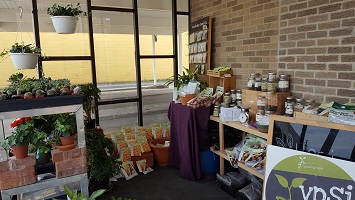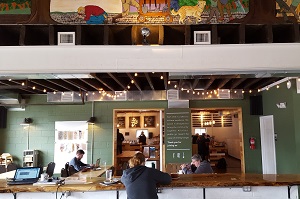Spoiler alert: If you like to be surprised when you pick up the League’s Review, maybe wait until you get the July issue to read this post-I’m going to be talking a bit about the projects from my article in that issue, because word count made me leave these notes out.
I recently sat down with the heads of two projects from the Public Spaces Community Places crowdgranting program; both projects adaptively reused vacant Ypsilanti properties as community spaces. One, the Ypsilanti Farmers Marketplace, has made an old drive-through bank mini-branch and adjacent 1930s warehouse into an indoor/outdoor market, event space, retail garden supply store, and demonstration kitchen. The other, Cultivate Cafe and Tap House, turned an unassuming auto repair garage into a community room.
In both cases, the business-like activities of the managing non-profit are a critical piece of the placemaking effort’s success, and good reminders that getting the physical design of the space right is not enough on its own.

Ypsiplanti offers an amazing array of garden tools, seeds, books, houseplants, compost, and similar products in a tiny footprint.
The Marketplace is teeming with people on market days: over 300 people visited in the first hour of the opening Tuesday earlier this month. But what happens the rest of the week? Many farmers market sites sit vacant and empty outside of market days. To address this, Growing Hope has opened “Ypsiplanti,” a hole-in-the-wall garden supply inside the old bank building. Not only does this fill a gap in downtown Ypsilanti, which previously lacked such a store, but it also draws some traffic to the site 6 days a week. The level of activity certainly doesn’t compare to market days, but having a staff member on the site provides “eyes on the street” and keeps the marketplace from feeling like dead space.
The founders of Cultivate, similarly, use the cafe’s coffee and beer to feed the nonprofit space’s function as a community gathering place, in terms of both revenue and people. Beverage sales pay for the few paid staff and keeping the lights on, with additional proceeds and tips going towards the organization’s charitable work of fighting hunger. Running a coffee shop certainly doesn’t qualify as “easy”, but providing people a cup of coffee while they talk is a way to raise money in the process of the community building work, rather than having to constantly set aside that function in order to focus on organizing fundraiser events.
As well, coffeehouses and pubs have set the model for “third places” for centuries for good reason-they are places people go individually and have spontaneous interactions, rather than relying on organized events to get people together. While I have attended specific, planned events at Cultivate, I’ve much more often gone there because, well, I wanted coffee, and wound up talking to someone I ran into. The first draft of my Review article was written there, which was perhaps a poor choice for productivity, but a good one for community: I was distracted repeatedly in talking to a neighbor, a city councilmember, a DDA board member, and a local historian who wanted to pick my brain about past property ownership on a particular street.
While the central focus of our placemaking work has been on the physical space-the piece cities tend to have the most direct control over-these examples highlight the importance of offering people everyday reasons to use the space. In both of these cases, the physical space and the activity generation were handled by the same organization, in conscious coordination. Cities may not be able to copy exactly these models in their own public space projects, but should actively look for partners who can provide reasons for people to use the space once it’s there.
